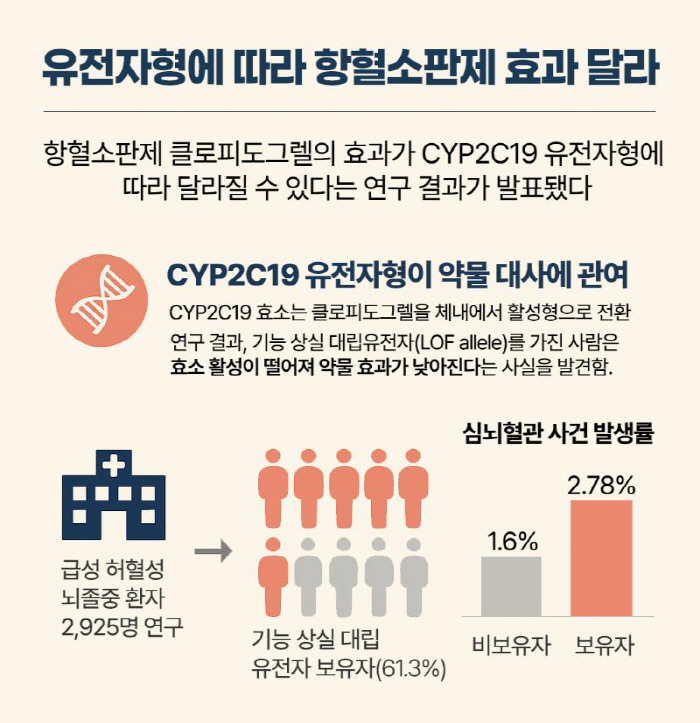Treatment of stroke, approach differently depending on genotype...Differences in Antiplatelet Treatment Effect
Jul 30, 2025
|
Clopidogrel is a representative drug that prevents a recurrence of stroke by preventing blood clots, and it is effective only when it is converted to an active type in the body. Previous studies have shown that CYP2C19, an enzyme involved in the activation process, has different activity depending on the genotype, and may be significantly less effective in some patients. In addition, prospective clinical studies directly linking genotype and drug effectiveness in stroke patients were insufficient.
The research team analyzed the CYP2C19 genotype of 2,925 patients who visited the hospital within a week of stroke, and followed their clopidogrel-based treatment progress for a year.
Of the patients surveyed, 61.3% had a dysfunctional allele (LOFallele). In the case of carrying a dysfunctional allele, the CYP2C19 enzyme activity decreases and the drug effect decreases due to the inability to sufficiently convert clopidogrel into an active type.
As a result of the study, the incidence of cardio-cerebrovascular events was 2.78% (49 out of 1785) in the group with the dysfunctional allele, which was significantly higher by 57.5% than 1.6% (18 out of 1125) in the non-preserving group. On the other hand, no difference was observed between the two groups in major bleeding or overall mortality. This means that the effect of treating antiplatelet drugs varies depending on the genotype, but the side effects are similar.
This study demonstrates the need for genetic information-based customized treatment, which approaches treatment methods differently depending on patient genes in stroke treatment. This means that patients with dysfunctional genes have less preventive effect of clopidogrel, so other alternative antiplatelet drugs should be considered for them.
Professor Lee Kyung-yeol confirmed the association between genotype and drug response in stroke patients with clinical figures. Since stroke is a disease with a high risk of recurrence and preventive treatment is important, we expect that individual genotype-based drug selection will be reflected in the guidelines for treatment in the future."
The study was recently published in the international journal JAMA Network Open (IF 10.5) under the title of cytochrome P450 2C19 genotypes and clopidogrel in patients with ischemic stroke 'Cytochrome P450 2C19 Genotypes and clopidogrel in Patients With Ischemic Stroke'.
|
This article was translated by Naver AI translator.















